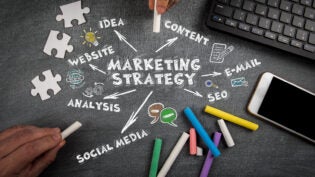
Marketing is a whole universe composed of plenty of branches that need to be discovered and mastered. Even though the premise sounds simple enough—you have a service or a product and you need to sell it—there are some undertones that people who familiarize themselves with the term “marketing” for the first time might have some trouble getting to the bottom of.
It’s not always all about the typical hierarchy that involves a big company selling things to the Average Joe. In fact, there are two important sides to marketing: B2B and B2C.
B2C (business to customer) is what we typically first think of when sales and marketing are brought into discussion. A person enters a store, makes a willing decision to purchase something, and acquires that particular thing with their own money for their own needs.
B2B (business to business) takes it to a higher level. Where do you think all these companies are getting their necessities and objects from? The business that’s selling you deodorant needs, in turn, to purchase materials from another business.
But the differences definitely stretch beyond the fact that this is an “Aunt Jill buying soap VS Bill Gates buying computers for Microsoft” situation. Therefore, here are the most crucial things setting these two sides apart.
Buying Purpose
Before getting into any technicalities about marketing strategies and whatnot, the first difference comes along with the very reason why people want to purchase anything. As far as B2C is concerned, the person who thinks about buying something is also the person taking the money out of the pocket. The acquired product is going to help with a necessity or an emotional whim.
B2B is more about meetings between company representatives. Person A is selling a service and Person B is purchasing it on the behalf of the big executive boss because they need it in order to help the business prosper. In this case, the purchase is thoroughly calculated.
Let’s expand a bit on the bolded words.
Influencing Factors
As previously established, a considerable majority of the purchases we make are made on a whim, influenced by our own personal desires and wishes. When we see something we haven’t eaten in forever and we’d really like to, we are very likely to buy it without even looking at the price. There are other factors influencing our decision making process, however, such as popularity, price, and quality.
On the other hand, B2B can be narrowed down to one question—How can this product or service help my company? Unlike B2C, this type of marketing needs to gravitate around profitability, potential, and advantageous pricing. When the main goal is to benefit the company, this leads to being disconnected from emotional influences.
Customer Interactions
Obviously, marketing for large general masses isn’t the same thing as trying to seal a transaction with a group of three or four people. In the case of B2C, campaigns and buyer–customer relationships are significantly less personal. The marketing strategy is aimed at a population as big as people via mass media or retail, among others.
Alternatively, B2B requires building trust and understanding. Other companies can be made aware of the services and products yours has to offer through billboards or other means, face-to-face meetings included. However, the buying process is significantly different. The decision is usually made over the span of several meetings and the marketing of a product is done directly on the spot to key players with power in decision-making.
Even though B2B is definitely more costly in terms of time resources, it guarantees a certain level of control over the process of decision-making. In B2C, it’s almost exclusively up to the customer to decide whether they take up on a purchase, whereas B2B allows for some persuasion and personal interactions.
Different Sales Value
Perhaps the most significant difference lies with the sold products themselves. As far as B2C is concerned, customers don’t require that much of the services and products being given to them. They need something that can sate their desire at hand and that’s it. Moreover, given how B2C is more mass-driven and aimed at general groupings of thousands and millions of people, there will also be multiple products involved.
B2B, on the other hand, deals with people who are very likely to analyze every tiny detail plucked out of the offer and quickly turn to another alternative should it prove to be better. Deals are sealed generally over five or six phone calls or face-to-face to meetings. As a result, the sheer level of difficulty and rarity involved elevate the value of the transaction when it actually happens.
B2B transactions involve everything from selling furniture to selling stock market actions or wings and pieces of a company, which means that most purchases are worth thousands of dollars.
As a conclusion:
- B2C is emotionally driven. B2B is task oriented.
- B2C is centered on needs and personal desires. B2B is focused on profit potential.
- B2C is for the general masses. B2B is for well-trained representatives.
- B2C is less personal, but quicker. B2B is more personal, but more time-consuming.
Author: Harrisson Dawson is a full-time writer, passionate about how business and technology bind. He specializes in SaaS Solutions and Cloud computing. He sometimes writes for CloudStorageAdvice.
2828 Views












